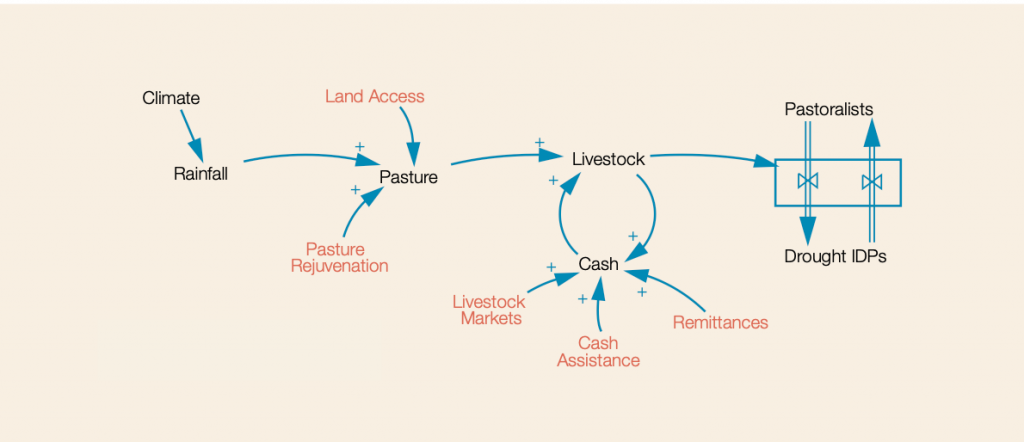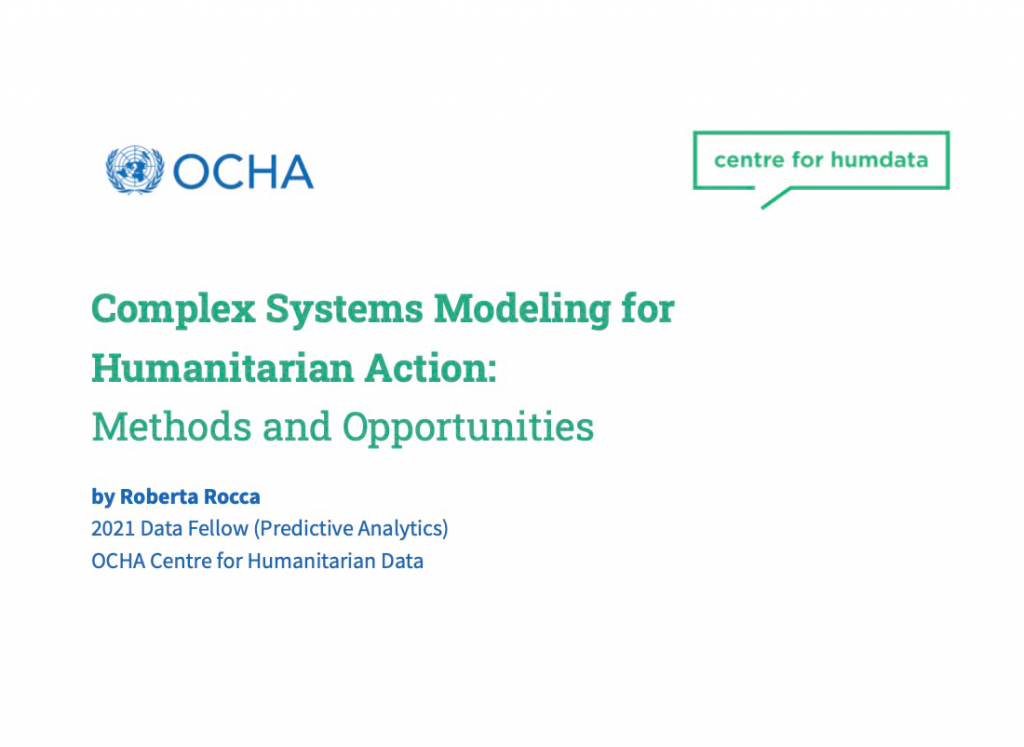Share
As the Centre’s 2021 Predictive Analytics Data Fellow, I conducted research on opportunities to use complex systems modeling to inform humanitarian action. In this blog, I present the main findings from my research and outline recommendations for how the Centre can take this work forward, including by piloting System Dynamics techniques.
Complex systems are systems whose global behavior is emergent, non-linear and adaptive:
- Emergent: It cannot be explained from the behavior of individual components but is said to emerge from the interactions between individual components.
- Non-linear: Due to the ways in which interactions between the multiple components of the system accumulate, small changes in the behavior of individual components may result in disproportionate effects on the global state of the system.
- Adaptive: Individual components of the system can change their behavior to adapt to changes in the behavior of other components.
Many social and natural phenomena can be described as complex systems. The climate is a notable example: climate phenomena emerge from the interactions between multiple subsystems, including the atmosphere, oceans and terrestrial ecosystems. Humanitarian crises can be also considered complex systems. Crises often come about as a result of interactions between multiple, mutually reinforcing political, social, and environmental factors, whose effects accumulate over time in non-linear ways.
In slow-onset and protracted crises, the effects of the interaction between multiple crisis drivers accumulate over long time scales. This is the case, for example, for protracted food insecurity crises, where several factors reinforce each other in ways which make interventions targeting single crisis drivers often ineffective. Other crises are punctuated by sudden-onset seasonal shocks, such as floods or typhoons, whose effects propagate to the whole system over very short time scales.
To intervene in humanitarian contexts where needs can change dramatically over time, current needs assessment processes could be complemented by modeling techniques which factor in these complex systems characteristics. Complex systems modeling is a class of mathematical methods that does so, making it possible to predict the behavior of a system over time based on a set of assumptions on how components of the system interact. These techniques could enable humanitarians to better model humanitarian crises, run dynamic projections of possible scenarios, and identify leverage points for interventions to maximise the impact of humanitarian action.
In researching the feasibility of using these models, I reviewed existing techniques with a focus on their fit to the needs and constraints of the humanitarian sector. In particular, I considered three techniques: network/graph models, agent-based modeling, and System Dynamics. I also outlined the feasibility, viability and desirability criteria that can help humanitarians assess whether a problem space is suited to a complex systems approach.
This research led me to conclude that while techniques such as network and agent-based modeling could provide robust ways to understand crises, at present, data requirements and limited interpretability make them less suited for a pilot of complex systems modeling in the humanitarian sector. I believe that System Dynamics, which is more assumption based, is better for a pilot due to its potential to support response simulation even in contexts with limited data availability.
Example of a System Dynamics diagram modeling pastoralist displacement (model developed by IDMC and described here).
Finally, I evaluated a set of humanitarian problem spaces to identify pilot options. To inform my evaluation, I interviewed domain experts and explored available data. I concluded that developing a simulator to evaluate the effectiveness of cholera response strategies would be feasible for an initial pilot. Preliminary data exploration and a potential roadmap for the development of a Cholera Response Simulator can be found here.
Complex systems modeling comes with many challenges, but it has the potential to provide an important contribution to our ability to understand and respond to the needs of crisis-affected communities. My main recommendation to the Centre is to continue exploring its potential beyond the scope of this project, through pilots and partnerships bringing together humanitarians and complex systems experts. A major challenge continues to be filling the data gaps that hinder model development, something the Centre is focused on addressing through data sharing on HDX.
If you are interested in learning more about this research, download my report. You can also watch the recording of a Centre-hosted event on complex systems modeling with speakers from academia and the humanitarian sector. If you have technical expertise with complex systems modeling and/or ideas on problem spaces to be explored using these methods, reach out to the Centre at centrehumdata@un.org.
* * * * *
Learn more about the 2021 Data Fellows Programme and watch the video of the Data Fellows Programme Showcase. The new roles for our 2022 programme will be announced in February or March 2022.

